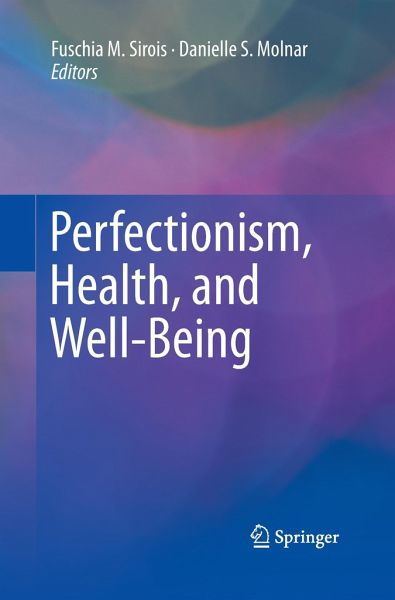
Perfectionism, Health, and Well-Being
Versandkostenfrei!
Versandfertig in 6-10 Tagen
76,99 €
inkl. MwSt.

PAYBACK Punkte
38 °P sammeln!
This book brings together the world's leading perfectionism researchers and theorists to present their latest findings and ideas on how and why perfectionism may confer risks or benefits for health and well-being, as well as the contexts which may shape these relationships. In addition to providing an overview of the latest research in this field, this volume explores new conceptual models that may help further our understanding of when, how, and why perfectionism may be implicated in health and well-being.After presenting an overview of the conceptual and measurement issues surrounding the co...
This book brings together the world's leading perfectionism researchers and theorists to present their latest findings and ideas on how and why perfectionism may confer risks or benefits for health and well-being, as well as the contexts which may shape these relationships. In addition to providing an overview of the latest research in this field, this volume explores new conceptual models that may help further our understanding of when, how, and why perfectionism may be implicated in health and well-being.
After presenting an overview of the conceptual and measurement issues surrounding the concepts of perfectionism, health, and well-being, three sections address the implications of perfectionism for health and well-being. The first of these sections provides an overview of research and theory on the role of perfectionism in health and illness, health behaviors, and chronic illness. The next section of the book focuses on the cognitive and affective underpinnings ofperfectionism as they relate to psychopathology, distress, and well-being, including how it applies to eating disorders, depression, and anxiety. The final section of the book explores specific contexts and how they may contour the associations of perfectionism with health and well-being, such as in the domains of interpersonal relationships, academic pursuits, and work-related settings.
Perfectionism and wellbeing is a topic not just for researchers and scholars, but clinicians
and practitioners as well. For this reason, chapters also include a discussion of prevention and treatment issues surrounding perfectionism where relevant. By doing so, this volume is an important resource for not only researchers, but also for those who may wish to use it in applied and clinical settings. By presenting the latest theory and research on perfectionism, health, and well-being with a translational focus, Perfectionism, Health, and Well-Being makes a unique and significant contribution to perfectionism as well as general wellness literature, and highlights the need to address the burden of perfectionism for health and well-being.
.
After presenting an overview of the conceptual and measurement issues surrounding the concepts of perfectionism, health, and well-being, three sections address the implications of perfectionism for health and well-being. The first of these sections provides an overview of research and theory on the role of perfectionism in health and illness, health behaviors, and chronic illness. The next section of the book focuses on the cognitive and affective underpinnings ofperfectionism as they relate to psychopathology, distress, and well-being, including how it applies to eating disorders, depression, and anxiety. The final section of the book explores specific contexts and how they may contour the associations of perfectionism with health and well-being, such as in the domains of interpersonal relationships, academic pursuits, and work-related settings.
Perfectionism and wellbeing is a topic not just for researchers and scholars, but clinicians
and practitioners as well. For this reason, chapters also include a discussion of prevention and treatment issues surrounding perfectionism where relevant. By doing so, this volume is an important resource for not only researchers, but also for those who may wish to use it in applied and clinical settings. By presenting the latest theory and research on perfectionism, health, and well-being with a translational focus, Perfectionism, Health, and Well-Being makes a unique and significant contribution to perfectionism as well as general wellness literature, and highlights the need to address the burden of perfectionism for health and well-being.
.














